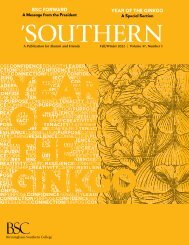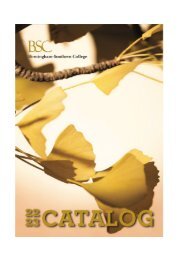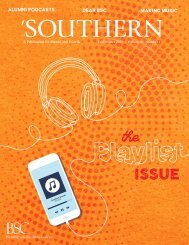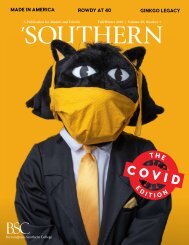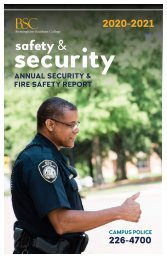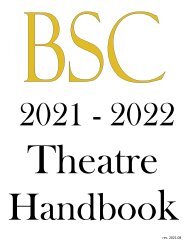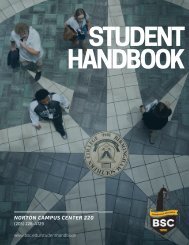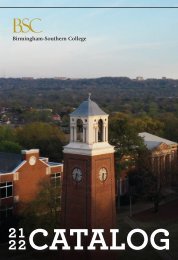Create successful ePaper yourself
Turn your PDF publications into a flip-book with our unique Google optimized e-Paper software.
PREFACE<br />
The Theatre Handbook has been compiled by the Theatre Faculty and Staff to give students<br />
majoring in Theatre and Musical Theatre, or minoring in Theatre, information about how the<br />
Theatre program operates. It covers major and minor requirements, audition information, special<br />
projects, production requirements, and other information pertinent to students interested in<br />
Theatre. We hope that you will find the handbook helpful and use it as a reference throughout the<br />
year.<br />
INTRODUCTION<br />
The following Mission Statement and Education Goals have been designed by the Theatre faculty<br />
to serve as guides for the activities of the department. It is our hope that work in the classroom<br />
and on stage is reflective of these principles, which strive to view the theatre not only as<br />
entertainment but also as a means to transform the lives of those affected by it.<br />
MISSION STATEMENT<br />
The BSC Theatre Program provides theatre training in the context of an undergraduate liberal arts<br />
tradition. We offer academic rigor within a challenging, collaborative array of courses and the<br />
production of plays and musicals. BSC Theatre's teaching reflects the importance of hard work,<br />
kindness, critical thinking, and humility. These combined have the power to create theatre which<br />
entertains, educates, and enlightens.
<strong>THEATRE</strong> FACULTY INFORMATION<br />
Alan Litsey, Professor | Theatre | Director of Community Engagement, Krulak Institute<br />
PhD, Directing, Wayne State University, 1991 / MFA, Acting, Michigan State University, 1984 /BFA, Theatre, University of LaVerne,<br />
1981<br />
Alan looks forward to collaborating with students in the production program, teaching acting, directing, playwriting, and<br />
leadership theory and practice. He has served as President of the Southeastern Theatre Conference (SETC) and is a<br />
member of the Actors’ Equity Association. His plays have been performed in the southeast, the Edinburgh Festival, and<br />
Bulgaria.<br />
Matthew Mielke, Professor | Theatre Design & Technology<br />
MFA, Theatre Design and Technology, University of Minnesota, 1986 / BA, Gustavus Adolphus College, 1982<br />
Matthew has worked professionally at the Tyrone Guthrie Theatre, Santa Fe Opera, Southern Ballet Theatre, Birmingham<br />
Children’s Theatre, Birmingham Festival Theatre, and as a free-lance scenic and lighting designer and theatre consultant.<br />
He has taught at Gustavus Adolphus College, Clemson University, and, since 1990, at B-SC. Matthew is a past winner of<br />
the Lois Garren Award for Excellence in Design and a member of the Southeastern Theatre Conference. His interests<br />
include history, aviation, and CADD (computer aided design and drafting).<br />
Lisa Gibbs, Adjunct Professor of Dance<br />
Lisa is a former professional dancer with Southern Danceworks, a modern dance company directed by Teri Weksler of the<br />
Mark Morris Dance group. During her seventeen-year career, Gibbs performed solos, duets, and ensemble pieces<br />
choreographed by Ms. Weksler and Robert Battle, Reggie Wilson, and Germaul Barnes. She also performed with<br />
Sanspointe and Arova prior to retiring from the stage in 2011. From 2022-2013, Lisa was on faculty at Samford University<br />
as the Coordinator of Dance and on staff as Administrative Assistant for the Department of Theatre and Dance. She<br />
currently teaches ballet at The Pointe Dance Arts and is a teaching artist at The Dance Foundation. In 2018, Dr. Gibbs<br />
attained an EdD in Higher Education Administration from the University of Alabama. Her focus throughout her studies were<br />
on dance in higher education and how dance in education relates to public education policy. She hopes to be a part of the<br />
creation of an undergraduate degree in dance education in Alabama and hopes to influence an increase in the number of<br />
public schools offering dance in the state.
Rebecca Yeager, Visiting Instructor of Theatre<br />
MFA, Performance, University of Southern Mississippi, 2013 / BA, Musical Theatre (Cum Laude), Birmingham-Southern College, 2006<br />
Rebecca is an actor and educator specializing in integrated movement and vocal techniques for the actor, including yoga,<br />
stage combat, and Lugering technique. She has a love for classical texts, Theatre for Young Audiences, and developing<br />
new works for all ages. During her time at USM, she was both an Irene Ryan Nominee and Regional Semi-Finalist at the<br />
Kennedy Center American College Theatre Festival. Rebecca spearheaded the Theatre for The Very Young program at<br />
Birmingham Children’s Theatre where she served as Artistic Development Coordinator. She is currently Vice Chair of the<br />
Theatre for the Youth Division of the Southeastern Theatre Conference and Vice Chair for the Professional Division of the<br />
Alabama Conference of Theatre. <br />
Jennifer Luck, Visiting Assistant Professor of Theatre | Technical Production Coordinator<br />
MFA, Scenography, University of Kansas 2005 | BA, Theatre, Birmingham-Southern College, 2002<br />
Jennifer has returned to her alma mater after teaching at several colleges and universities, including Jacksonville State<br />
University and Maryville College. Her design credits range from Assistant Lighting Designer for Creflo Dollar’s Los Angeles<br />
Revival while in graduate school to developing new works with Title:Point, an experimental theatre company started in New<br />
York City with friend and colleague Theresa Buchheister. Over the course of her career, she has worked for theatre<br />
companies across the U.S., in New York, Wyoming, South Carolina, Tennessee. Jennifer takes a holistic approach to<br />
collaboration in all aspects of theatrical design, which is rooted in her Scenography training. In addition to her work as a<br />
designer, she is an advocate for broadening the voices of women and minorities in the theatre. Including diverse stories in<br />
our theatrical repertoire is of vital importance to efforts of diversity and inclusion in the theatre profession both onstage and<br />
off. Producing performances which include these perspectives allows audiences a space to further develop and exercise<br />
empathy for all.
<strong>THEATRE</strong> STAFF INFORMATION<br />
Tamara “Tam” DeBolt is honored to be a Guest Director at BSC, her first time in an academic setting. She has performed<br />
with, designed for, directed at, and volunteered in almost every theater in town. Tam began her professional theater career<br />
in Indianapolis, IN over 30 years ago, moved to Birmingham in 1998, and quickly became an active member of its theatre<br />
community. Besides being at BSC with John Proctor is the Villian, she is the Executive Director of Terrific New Theatre –<br />
soon relocating to downtown Birmingham! Read more at: www.terrificnewtheatre.com/new-building<br />
Patti J. Manning, Costume Designer | Coordinator<br />
Patti has served as the Costume Designer/Coordinator for the College Theatre productions since 1981. She has designed<br />
for the Birmingham Opera Theatre, State of Alabama Ballet, Jewish Art Theatre, Birmingham Festival of Arts, and<br />
Birmingham Children’s Theatre. This past summer 2016 she was Costume Coordinator for Cable station EWTN’s The<br />
Masterpiece Donut Shop series, The Roamin Catholic. Patti has taught costume design for the BSC Conservatory camps<br />
and the Summerfest Workshop during the summer and has served as the Publicity Chairperson on the Birmingham Opera<br />
Guild and Publicity Co-Chairperson for the Alabama Symphony Decorator Showhouse. She is a past winner of the Lois<br />
Garren Award for Excellence in Costume Design and the National Society of Arts & Letters Career Award.<br />
Judy E. Pandelis, BSC Arts Alliance Coordinator | Manager of the College Theatre Box Office | Administrative Assistant<br />
Entering her 35 th year at BSC, Judy serves as Administrative Assistant for the Division of Visual & Performing Arts as well as<br />
the Dance Program where she oversees the publicity and scheduling of multiple department events, designs opera/theatre<br />
programs, handles bookkeeping, payments to guest artists/speakers, vendors, etc. She also serves as the Manager of the<br />
College Theatre Box Office where training twelve-to-twenty Financial Aid Work Study Students who serve as Assistant<br />
Office Managers and Assistant Box Office Managers. Judy schedules facilities for seasonal Visual & Performing Arts<br />
events. As Coordinator for the BSC Arts Alliance, she stays in touch with the Arts Alliance Benefactors, Patrons, and<br />
Members to inform them of annual events. She is the author of the Children’s Book Bloomin’ Harmony found at<br />
www.lulu.com and enjoys creating jewelry as well as working with others in an effort to bring about a more peaceful and<br />
unified global existence. Judy wishes to continue serving others in these capacities and helping those interested in<br />
enriching their lives with a higher education to attend Birmingham-Southern College.<br />
Megan Pecot, Costume Shop Supervisor<br />
BA, Theatre Arts, Birmingham-Southern College, 2018<br />
Megan is a graduate of Birmingham-Southern’s Theatre Department. This is her fourth year on The Hilltop as Costume<br />
Shop Supervisor. When She’s not assisting Ms. Patti J. Manning, you can find her designing costumes or performing
around Birmingham. Recent costume design credits include A Wrinkle in Time, A Doll’s House, and Amelia Earhart. When<br />
not doing theatre, she loves spending time with her husband and three big dogs. Forward Ever!!
IMPORTANT CONTACT INFORMATION<br />
When calling from an on-campus telephone, enter only the last four numbers of the extension. When calling from offcampus,<br />
use the telephone numbers listed below. <br />
CONTACT<br />
Art & Art History Office<br />
PHONE NUMBER<br />
205.226.4928<br />
EMAIL ADDRESS<br />
art@bsc.edu<br />
BSC Arts Alliance Office<br />
205.226.4953<br />
artsalliance@bsc.edu<br />
BSC Theatre Box Office<br />
205.226.4780<br />
bsctheatre@bsc.edu<br />
Media & Film Studies Office<br />
205.226.4928<br />
art@bsc.edu<br />
Music Office<br />
205.226.4950<br />
music@bsc.edu<br />
Theatre Office<br />
205.226.4782<br />
bsctheatre@bsc.edu<br />
Campus Police<br />
205.226.4700<br />
campuspolice@bsc.edu<br />
Alan Litsey<br />
205.332.0439<br />
alitsey@bsc.edu<br />
Jennifer Luck<br />
205.936.0899 (cell)<br />
jeluck@bsc.edu<br />
Patti J. Manning<br />
205.226.4787<br />
pmanning@bsc.edu<br />
Matthew Mielke<br />
205.226.4785<br />
mmielke@bsc.edu<br />
Judy E. Pandelis<br />
205.226.4928<br />
jpandeli@bsc.edu<br />
Megan Pecot<br />
205.226.4787<br />
ampecot@bsc.edu<br />
Rebecca Yeager<br />
n/a<br />
ryeager@bsc.edu
<strong>2023</strong> - <strong>2024</strong> COLLEGE <strong>THEATRE</strong> SEASON<br />
Join the BSC Arts Alliance for early access, discount tickets, and other benefits.<br />
https://www.bsc.edu/artsalliance/index.html#MemberBenefits<br />
Tickets go on sale three (3) weeks prior to opening night for BSC Arts Alliance members and two (2) weeks prior to opening<br />
night for the general public. The College Theatre Box Office hours are Monday through Friday from 1:00 p.m. until 4:45<br />
p.m. during these weeks. The College Theatre Box Office can be reached at 205.226.4780.<br />
General ticket prices are $17.00 for John Proctor is the Villian and $22.00 for The Fantasticks. BSC Employees and all<br />
student tickets are $12.00 regardless of what school the student may attend.<br />
Reserved tickets will be held at Will Call until 15 minutes prior to the opening of the production.<br />
Credit Cards only are accepted for purchases.<br />
BSC Productions are not appropriate for all ages. Please use discretion when purchasing tickets for anyone under the age<br />
of six (6). Front of House personnel reserve the right to escort disruptive patrons from the theatre.<br />
For more information: https://www.bsc.edu/academics/theatre/productions.html<br />
November 09, 10, & 11 at 7:30 p.m. | November 12 at 2:30 p.m. | College Theatre | The Underground<br />
John Proctor the Villian<br />
At a rural high school in Georgia, a group of lively teens are studying “The Crucible” while navigating young love, sex, and a<br />
few school scandals. Holding a contemporary lens to the American classic, they begin to question who is really the hero<br />
and what is the truth, discovering their own power in the process. Alternately touching and bitingly funny, this new comedy<br />
captures a generation in mid-transformation, running on pop music, optimism, and fury, writing their own coming-of-age<br />
story.<br />
Reservations begin: Thursday 19 th October<br />
Comp ticket requests: Thursday, October 19 th through Monday October 30 th
April 18, 19, & 20 at 7:30 p.m. | April 21 at 2:30 p.m. | College Theatre | Mainstage<br />
The Fantasticks<br />
The Fantasticks is a funny and romantic musical about a boy, a girl, and their parents who try to keep them apart. The<br />
narrator, El Gallo, asks the audience to use their imagination and follow him into a world of moonlight and magic. The boy<br />
and the girl fall in love, grow apart, and, finally, find their way back to each other after realizing the truth in El Gallo’s words,<br />
that, “without a hurt, the heart is hollow.”<br />
Reservations begin: Thursday 28 th March<br />
Comp ticket requests: Thursday, March 28 th through Monday April 8th<br />
May 13 & 14 at 7:30 p.m. | College Theatre | The Underground<br />
Student-Directed One Act Plays<br />
An uproarious and often unpredictable evening of drama and comedy, as presented by first-time student directors as a part<br />
of the requirements for Tha403, Directing and Stage Management.<br />
No reservations required. Admission is free and seating on a first come, first-served basis.
HELPFUL LINKS<br />
COURSE CATALOG<br />
The current Course Catalog can be found at:<br />
https://www.bsc.edu/academics/catalog/index.html<br />
COURSE SYLLABI<br />
Syllabi are available on Moodle and Basecamp. If you do not already have access to these sites, contact Jennifer Luck<br />
(jeluck@bsc.edu) to be added to the appropriate projects.<br />
Download Basecamp App here: https://basecamp.com/via<br />
Download Moodle Apps here: https://download.moodle.org/<br />
OTHER RESOURCES ON CAMPUS<br />
The Writing Center <br />
Academic Resource Center <br />
Counseling and Health Services<br />
Crisis Center of Birmingham<br />
Magic City Acceptance Center<br />
YWCA<br />
OTHER RESOURCES OFF CAMPUS
PROFESSIONAL EXPECTIONS<br />
A successful theatre requires clear communication. The Theatre Hierarchy Chart tells you who to report to for questions,<br />
supervision, and assistance based on your role within the Theatre Program or in a specific production. Actors &<br />
technicians are expected to conduct themselves in a professional manner consistent with best practices for theatre<br />
production. These include:<br />
REHEARSAL<br />
1. Arriving at rehearsals 10 – 15 minutes early so you are ready to begin at the designated time. Call time is GO TIME,<br />
not “walking in the door time.”<br />
2. Upon arrival to each technical/dress rehearsal, initial the sign-in sheet on the call board by the Green Room. Being<br />
prepared for rehearsal, which includes:<br />
a. Conducting script and character analysis<br />
b. Learning lines and blocking<br />
c. Being off book on or before the assigned date<br />
d. Being ready to take notes as necessary – bring your pencil, script, notebooks, etc. as required by your<br />
position.<br />
e. Warming up before rehearsal physically, mentally, and emotionally.<br />
3. Wear shoes and clothing appropriate to your movements and actions during rehearsal.<br />
4. Be prepared to apply all notes at the next rehearsal.<br />
5. During notes, listen attentively, accept notes graciously, and only ask questions that serve the group. Questions<br />
about individual work, objections to a note, or other discussion should be saved for another time. Defensiveness is<br />
not productive. Notes are how we improve.<br />
6. Do not give notes, line readings, or prompts to another actor, director, or technician. Only the director, technical<br />
director, designers, and stage manager should give notes.<br />
7. If you need to leave the building during rehearsals or performances, you must notify and obtain permission from the<br />
stage manager.<br />
8. Cell phones are to be used only for urgent or professional communication. If you have questions about what<br />
qualifies, see your faculty/staff supervisor for clarification.<br />
9. Food and drinks not required for the production should only be consumed during breaks and outside of the theatre<br />
space. Only water may be kept backstage for breaks<br />
COSTUME FITTINGS<br />
1. Arrive to costume fittings on time, showered and dressed in the appropriate undergarments.
2. Nothing other than water (in a closed container) should be consumed while in a fitting or in costume.<br />
3. Designers, dressers, and actors will treat one another with respect and keep conversation professional and<br />
courteous.<br />
WORK CALLS (BUILDS AND STRIKES)<br />
1. All cast and crew members are required to attend strike.<br />
2. Additional work calls out of shop hours will be scheduled as far in advance as possible. If you are unavailable, the<br />
reason must be cleared with the Technical Director. These calls will not be necessary for every show but may be<br />
necessary for some.<br />
LATE OR NO-SHOW POLICY FOR REHEARSAL, COSTUME FITTINGS, AND WORK CALLS<br />
1. The first time a student is late they will receive a warning.<br />
2. The second time a student is late, this will cost the student ½ letter grade off the final grade for the production.<br />
3. Failure to show up at a rehearsal or costume fitting will result in the reduction of a whole letter grade.<br />
4. Each successive tardy or absence will also affect the student’s grade in a similar fashion.<br />
.
GENERAL DEPARTMENT POLICIES<br />
<strong>THEATRE</strong> CLASSROOM ATTENDANCE POLICY<br />
Don't miss class. Students are expected to attend every class meeting.<br />
• Extenuating circumstances will be dealt with on an individual basis.<br />
• Students are expected to arrive on time. If you are late to class, enter respectfully so as not to disturb others’<br />
learning.<br />
• Students are expected to stay for the entire class period. Leaving early, without permission, will negatively affect the<br />
students’ grade<br />
• Cell phones must remain put away during class. Extenuating circumstances should be discussed with the professor.<br />
The theatre faculty reserves the right to adjust policies, as appropriate for each class.<br />
USE OF THE UNDERGROUND<br />
General guideline: Leave no trace.<br />
The Underground may be used for class rehearsal time, but students must comply with the following rules:<br />
1. Students may use cubes and chairs but must return them to the designated storage space after each rehearsal.<br />
This should be where you got them from. However, if someone else failed to restore the space, you should put<br />
them where they belong.<br />
2. All set pieces and props must be struck after each rehearsal and returned to their correct storage location.<br />
3. All trash must be disposed of appropriately before leaving the theatre. When finished, all stage lights must be<br />
turned off and the Ghost Light must be turned on.<br />
4. Unless you have discussed using additional furniture or props with a faculty member, you should utilize the<br />
standard items in the theatre. Approval to use other stock items will include instructions on where to strike them for<br />
others using the space.<br />
5. NO SMOKING, NO FOOD, and NO DRINK, other than water, permitted in The Underground without permission of<br />
faculty. Permission will only be granted as scenes require.
AUDITION/INTERVIEW POLICY<br />
All Theatre and Musical Theatre majors (including Scholarship Students) are expected to audition for all major<br />
Theatre productions. (Students who do not consider themselves singers are not required to audition for<br />
musical productions but are required to participate in the technical interview process.) <br />
1. Students are expected to arrive promptly and prepared.<br />
a. Faculty members are willing to help students in their preparation for both on-and off-campus auditions.<br />
b. Students should ask the director and/or a faculty member early enough to make the necessary<br />
preparations. This is typically two (2) weeks in advance.<br />
c. Students should have audition materials chosen at least one (1) week in advance.<br />
2. Students should always wear hair and clothing style that are professional and appropriate for the character/show for<br />
which they are auditioning.<br />
3. All interviewing students should bring their current resume and/or portfolio for technical interviews. This requirement<br />
is waived for first-year students.<br />
4. Students are also expected to come to auditions/interviews with the dates of any commitments that may fall during<br />
the rehearsal/performance and write them on the audition form.<br />
a. Academic and college scholarship commitments will be honored<br />
b. Religious commitments will be honored<br />
c. Outside employment, vacations, family commitments, weddings, other potential conflicts not mentioned<br />
above may or may not be honored at the faculty’s discretion.<br />
5. Students are expected to accept cast and crew positions to which they are assigned.<br />
OFF-CAMPUS PRODUCTION POLICY<br />
The faculty encourages all theatrical experiences which fall in-line with the student’s individual abilities, needs, and<br />
goals and serve to supplement their educational experience. The faculty gives the highest priority to on-campus<br />
productions, which are designed with specific educational objectives as their primary goals.<br />
Students majoring in theatre or musical theatre may audition for off-campus musical/theatrical productions<br />
during the regular school year, only with the approval of the theatre faculty. The faculty will work with each<br />
student to plan performance activities on campus and will advise students as to the educational value of the off-campus<br />
opportunities. Students who hold scholarships in theatre or musical theatre are required to participate in on-campus<br />
performance activities.
SOPHOMORE REVIEWS<br />
Theatre<br />
Each student interested in declaring a major or minor in theatre must complete an interview with the theatre faculty prior to<br />
the declaration (usually at the end of the sophomore year). The interview is designed to assess the student’s abilities,<br />
strengths, and weaknesses. The faculty will make recommendations to the student concerning completion of the program<br />
and goal setting. <br />
Musical Theatre<br />
All potential musical theatre majors are required to successfully complete a musical theatre review at the end of their<br />
sophomore year in order to qualify as a musical theatre major. This includes a voice jury with the music faculty, an interview<br />
with the theatre faculty, and a written review of class progress by the dance faculty. If a student is weak in any one of the<br />
three areas, the student may be given one probationary semester in which to improve in that area. <br />
SENIOR PROJECT IN <strong>THEATRE</strong><br />
The Senior Paper examines the senior interim as a “capstone” of your learning as a Theatre Major, but other BSC<br />
experiences may be integrated as well. Evaluation of your paper is an essential part of your senior grade. Students are<br />
expected to consult with a faculty member on the focus of their paper, academic framing, and proposed bibliography. The<br />
THA 472 Syllabi contains requirements and details for successful completion of the senior project.<br />
DEPARTMENTAL PURCHASING PROCEDURE<br />
Discuss purchase with faculty supervisor for item to be approved. Items online can be purchased by the faculty member<br />
directly. If the item is local, follow these steps:<br />
1. Borrow their PCard to make the purchase.<br />
2. All purchases MUST BE TAX EXEMPT. Make sure to obtain a copy of the tax exempt letter<br />
3. Notify Customer Service prior to shopping then show the cashier at point of purchase about the tax exemption<br />
BEFORE the transaction begins.<br />
4. Return the card and receipt to the faculty supervisor.
GENERAL SHOP SAFETY PRACTICES<br />
1. Report to work in attire suitable for the job:<br />
a. Closed toe shoes with hard soles. No sandals or clogs.<br />
b. Clothes that can get dirty<br />
c. Durable fabrics<br />
d. Clothes that provide freedom of movement.<br />
2. Long hair should be tied back securely or confined with a cap or scarf. Loose hair obstructs vision and can get<br />
caught in power tools.<br />
3. Wear safety equipment provided.<br />
4. Know where the first aid supplies are kept and report any injury, regardless of how minor, to the person in charge.<br />
5. Be aware of your surroundings and what others are doing.<br />
a. Leave people sufficient room to accomplish their task.<br />
b. Be careful when walking through an area where others are working as they may not be able to see or hear<br />
you.<br />
c. Be aware of nails, screws, tools, etc. on the floor, sticking out of boards, or in other locations they should<br />
not be.<br />
d. Clean up after yourself. Scrap materials, even sawdust, can be hazardous, and they can add to the clutter<br />
of shop activity.<br />
6. If you see a situation that does not appear safe, report it. It is easier to prevent accidents than to repair them.<br />
7. Request and get instructions about operating power equipment before attempting to use them then exercise<br />
caution.<br />
a. Check each tool before using it. If repairs or conditioning is necessary, seek the assistance of the person<br />
in charge. Dull tools are more hazardous than sharp ones.<br />
b. Use tools for the purpose for which they were designed.<br />
c. Cutting tools should be laid aside so their sharp edges do not rest on the floor or other hard surfaces.<br />
d. When a tool is no longer needed, return it to the tool room. Tools must not be left scattered about the<br />
shop.<br />
8. Always be alert for hazards and materials that might cause a fire. This applies particularly to highly combustible<br />
materials and fumes. These items should always be stored in one of the flammables cabinets in the scene shop.<br />
a. Rags used to wipe away oil and oil-based paints must be disposed of in a closed metal container to prevent<br />
spontaneous combustion.<br />
b. Smoking is not allowed anywhere in the theatre building.<br />
c. Note the location of fire extinguishers.
9. If you're not sure...ask! You are here to learn, so there are no stupid questions. The only people who look foolish<br />
are the ones who didn't find out how to do a task correctly before they started.<br />
All students will sign the Safety Practices Acknowledgement form available HERE
TYPICAL* <strong>THEATRE</strong> ORGANIZATION CHART<br />
*This chart is modified by theatre companies to suit their specific needs. Non-profit and For-Profit theatres have slightly<br />
different charts. Academic institutions relegate Producer responsibilities to faculty & administrators. You should ALWAYS<br />
find out who you report to when you are “hired” for the role.<br />
Please note: Some of this terminology is outdated. However, you will often still hear people refer to the "Master<br />
Electrician" or "ME". However, in attempts to incorporate more inclusive language in the theatre, we have changed these<br />
labels to "Crew Head" rather than "Master". It is good to be familiar with both terms in order to understand various<br />
working environments and job titles within our industry. If you have questions or concerns about this, please come talk to<br />
one of the faculty.
STUDENT DESIGNER RESPONSIBILITIES<br />
STUDENT COSTUME DESIGNER (SCD)<br />
In consultation with faculty and staff, Student Costume Designers:<br />
1. Read an analyze the script<br />
2. Conduct the needed research<br />
3. Create rudimentary costume sketches<br />
4. Coordinate purchases with the Costume Designer using the Department Credit Card<br />
5. Keep purchase receipts organized and correctly labeled (initialed and notated with name of production)<br />
6. Copy all receipts and give copies and original receipts to the Costume Designer<br />
7. Return all unused items in a timely manner using the original receipts.<br />
STUDENT SCENIC DESIGNER (SLD)<br />
In consultation with faculty and staff, Student Scenic Designers:<br />
1. Read an analyze the script<br />
2. Conduct the needed research<br />
3. Create renderings, sketches, and/or models<br />
4. Create drafting required to produce the design – Ground Plan, Side Section, Elevations of Scenic Units, and any<br />
other show specific drafting<br />
5. Coordinate purchases the faculty supervisor, adhering to the Departmental Purchasing Procedures<br />
6. Coordinate with the Scene Shop Crew to implement the design.<br />
7. Attend production meetings, designer run rehearsals, and technical rehearsals<br />
8. Attend Strike<br />
STUDENT LIGHTING DESIGNER (SLD)<br />
In consultation with faculty and staff, Student Lighting Designers:<br />
1. Read an analyze the script<br />
2. Conduct the needed research<br />
3. Create rudimentary storyboards<br />
4. Create Light Plot and Paperwork<br />
5. Coordinate purchases the faculty supervisor, adhering to the Departmental Purchasing Procedures<br />
6. Coordinate with the Lighting Crew Head and Crew to implement the design.<br />
7. Program all light cues<br />
8. Attend production meetings, designer run rehearsals, and technical rehearsals<br />
9. Attend Strike
MANAGEMENT AND CREW HEAD RESPONSIBILITIES<br />
Crew members are responsible for their own backstage “blacks” and personal flashlights.<br />
STAGE MANAGER<br />
Deadlines, Prior to the First Rehearsal:<br />
1. Reading the Lawrence Stern text and developing a clear understanding of the responsibilities of the Stage<br />
Manager (Chapters 1-5; 8-10; and 12-15).<br />
2. Assembling Prompt Book.<br />
3. Developing a clear understanding of the play and all technical elements (i.e. characters, props, sound cues,<br />
scene breakdown, etc.).<br />
Rehearsal Period Responsibilities include:<br />
1. Understanding the principles of Stage Management by Lawrence Stern.<br />
2. Maintaining an open line of communication with the director to discuss any questions or concerns.<br />
3. Ensuring that the overall production process runs smoothly, seeing that each job is done with a minimum of<br />
fuss.<br />
4. Thinking ahead with detailed documentation of the production process; master schedule, calendar, to-do-lists,<br />
duty rosters, prompt script, and check lists.<br />
5. Maintaining an on-going list during rehearsals for production meetings (i.e. props added or deleted or questions<br />
for the Technical Director or Designers).<br />
6. Keep detailed notes and produce:<br />
a. Production meeting reports<br />
b. Rehearsal reports<br />
c. Performance reports<br />
7. Support the actors.<br />
8. Organize things efficiently so the actors can get the maximum benefit from the rehearsal time.<br />
9. Take all blocking notation (advise the director of blocking errors during rehearsal)<br />
10. Begin and end rehearsals and breaks in a timely manner<br />
11. Make careful notes of where props are placed off-stage or discovered on stage using the pre-set diagram/list<br />
12. Time the show as running rehearsals begin. Keep the director apprised of the timing of each act.<br />
13. Arrive fifteen (15) minutes prior to sweep the stage and arrange set and props<br />
14. Prepare a work area for yourself.<br />
15. Tape stage floor at the start of rehearsal process in conjunction with the TD and the ASMs.
16. Develop the Stage Manager Prompt Book containing:<br />
a. Script<br />
b. All notations for lighting and sound cues.<br />
c. Blocking notations<br />
d. Technical schedules<br />
e. Rehearsal schedules<br />
f. Sound plot<br />
g. Light plot<br />
h. Ground plan<br />
i. Company list<br />
j. Pre-show duty list<br />
k. Show specific paperwork and documentation – fight or dance choreography, intimacy forms and paperwork,<br />
etc.<br />
Technical Rehearsals:<br />
1. Discuss cue calling sequence and head set etiquette with TD<br />
2. Discuss Level Set with Lighting Designer and Director on setting cues<br />
3. Determine which ASMs shall be “headset ASMs” on SL or SR.<br />
4. Call all lighting, sound, and sound effects cues, (should call them from the first rehearsal when possible)<br />
5. Spike all set pieces (the set pieces should be in the same place during each rehearsal)<br />
6. Prepare Call Script with lighting, sound, and sound effects cues noted before first Technical Rehearsals -<br />
a. Make tabs for each scene (if appropriate) for quick referral and tab such information as cast list, expenses,<br />
props, schedules, sets, etc.<br />
b. Make a legend (key) for all notations.<br />
c. For every light, sound, and special effect, use a ruler and light pencil. Draw a horizontal line closest to the<br />
line of dialogue preceding a verbal cue or under the description of a visual cue. The line should cross the<br />
entire Prompt Book page so you can see it easily during rehearsals.<br />
d. Insert Warning and Standby cues as well as GO cues<br />
e. Since changes may occur, use a pencil only.<br />
Performances:<br />
1. Follow the direction of the Box Office Manager as to cue to begin performance as well as after intermission.<br />
2. Oversee all backstage activities during the run of the show including the calling of cues to lighting, sound,<br />
sound effects, follow-spot, stage, and lift operators.
3. The Stage Manager runs the show in performance<br />
a. Out of respect for the Stage Manager’s function, the actor should always yield to them<br />
b. Actors should obey directives given by the Stage Manager.<br />
Material cited and edited from: Stage Management by Lawrence Stern<br />
See Rehearsal and Performance Report Forms and iPAD policy Form<br />
ASSISTANT STAGE MANAGER / PROPS<br />
The Assistant Stage Manager (ASM) works with the Stage Manager (SM) and Props Crew Head under the technical<br />
director’s guidance. Usually, two to four (2-4) ASMs are needed for a production. The ASM:<br />
1. Assists the Crew Head in gathering the props for productions and, with the Stage Manager, gathers rehearsal props<br />
for use. Shopping may be involved so having access to a vehicle is helpful.<br />
2. Assists the Stage Manager during rehearsal as needed<br />
3. During performances works with the Stage Manager to assure the smooth operation of the backstage areas.<br />
COSTUME MANAGER<br />
The Costume Manager works with the Costume Designer and Wardrobe/Dresser crew. The CM has the following<br />
responsibilities:<br />
1. Putting in a MINIMUM of four (4) hours per week in the costume shop.<br />
2. Must collaborate with the Costume Designer/Coordinator and the rest of the Costume Crew to set up a weekly<br />
working schedule. Each crew member is responsible for adhering to this schedule as this is a grade and<br />
missing shop hours can result in a lower grade in THA 201.<br />
3. In charge of restocking any costumes/costume pieces left over from previous shows as well as any costumes that<br />
have been pulled and no longer needed.<br />
4. Work with the Costume Designer/Coordinator and the Stage Manager to create a costume plot (and itemized list of<br />
which costumes and costume pieces belong to which actor, where each costume begins, how (both when and<br />
where) a costume travels during the run of a show, and who oversees presetting, moving, and striking each<br />
costume and/or costume piece.<br />
5. Once costumes have been “somewhat” finalized, the Costume Manager must work with the Stage Manager and<br />
the Costume Designer to decide whether or not there will be quick changes during the performance. If quick<br />
changes are necessary, the Costume Manager should collaborate with the Stage Manager about when and where<br />
the changes will occur. A Show Run Plot (Quick Change Plot) should be made and posted on either side of the<br />
stage. This list must include the character/actor’s name, which scene the change occurs after, which costume will<br />
be taken off and which costume
will be put on, and average of how much time the actor is allotted to change, and which Dresser(s) is assigned to<br />
that quick change.<br />
6. Laundry and repair needs that arise during the run of a show. These tasks should be completed daily BEFORE call<br />
time for each show so duties and actors’ needs can be tended to as one prepares for the show.<br />
PROPERTIES CREW HEAD<br />
Property Crew Heads have a lot of responsibility. Previous experience as an Assistant Stage Manager/Props and/or in THA<br />
110 Stagecraft or THA 310 Stage Design would be helpful. <br />
The Props Crew Head: <br />
1. Works with the designer and director under the guidance of the technical director to locate all properties used in<br />
productions<br />
2. Props may be pulled from stock, purchased, borrowed, built, painted, or found. This may include shopping at<br />
antique, junk, thrift stores, etc. Having access to a vehicle is almost essential.<br />
3. Follows departmental purchasing procedures<br />
4. Oversees the props backstage during production, making repairs as needed.<br />
LIGHT CREW HEAD<br />
Light Crew Heads also have responsibilities for which previous experience as a light technician and/or THA 211 Stage<br />
Lighting is helpful. The LCH: <br />
1. Works under the guidance of the lighting designer (LD) to implement the LD’s design decisions<br />
2. Organizes the lighting technicians that make up the hang/focus crew<br />
3. Trains the crew in proper procedure<br />
4. Prepares lighting equipment for use<br />
5. Schedules and runs hang/focus sessions<br />
6. Locates any color media, patterns, rentals, and special equipment<br />
7. Follows departmental purchasing procedures<br />
8. Takes notes during the cue setting, tech and dress rehearsals<br />
9. Makes changes needed by the LD.
COMPANY MANAGER DUTIES & RESPONSIBILITIES*<br />
*These duties will be amended and reassigned should the Company Manager also be cast or carry other crew<br />
responsibilities within the production<br />
Before Rehearsal Period:<br />
1. Assist with auditions if the Company Manager position is assigned in advance<br />
2. Assemble and distribute a Company Contact List with name, cast or crew position, and contact information for each<br />
company member, guest artists, and faculty and staff members.<br />
During Rehearsal Period:<br />
1. Meet with the Box Office Manager (BOM) to discuss:<br />
a. Program Information Details<br />
b. Complimentary Ticket Details<br />
c. Course Evaluation Forms<br />
d. Usher Needs and Assignments<br />
2. Inform all company members of the comp ticket policy<br />
a. Gather information from company members for their reservation<br />
b. Communicate comp ticket reservations to BOM by the second week of rehearsal<br />
3. Coordinate on and off campus publicity with the Publicity Manager<br />
4. Distribute all drafts of the program to faculty, staff, and company members for proofreading<br />
Production Meetings<br />
The Company Manger will attend all production meetings to assist the Stage Manager as need. This may include:<br />
1. Sending reminder calls and e-mails<br />
2. Taking roll<br />
3. Contacting absent or tardy company members<br />
4. Take and/or distribute notes<br />
During Tech Week<br />
1. Design and assemble the Lobby Callboard with Production-related materials.<br />
2. Act as House Manager and assist the Ushers.<br />
a. Contact and schedule ushers for each performance<br />
b. Use the Usher Policy information in this handbook as a guide.<br />
c. Make sure the house is clean and all potential audience hazards are addressed.
d. Coordinate with Campus Police any special needs for movement-impaired audience members<br />
e. Communicate with Stage Manager for the opening and closing of the house<br />
3. Announce or post any changes or omissions in the program in an appropriate place.<br />
After Final Performance<br />
1. Remind the cast and crew to complete their Course Evaluation Forms<br />
2. Return the Lobby Callboard to its Pre-show state
PUBLICITY MANAGER<br />
The Publicity Manager (PM) is responsible for acquiring details about each production in order to create advertising and<br />
marketing to attract an interested audience. These duties include:<br />
1. Maintain the departments social media presence by:<br />
a. See faculty for current practices regarding BSC Theatre social media accounts<br />
b. Posting on-going rehearsal photos<br />
c. Spotlighting students through company member features and interviews<br />
d. Creating and posting video updates about current BSC Theatre Students<br />
e. Post on Birmingham Area Theatre groups on Facebook, such as Birmingham Theatre Family and<br />
Birmingham-Southern Arts Alliance<br />
f. Posting at least three (3) times per week and each day during production week<br />
2. Design a production banner at least two (2) weeks prior to the production<br />
a. Check with faculty for specs required by licensing to include all contracted language and content<br />
b. Photoshop is available in Computer Labs (Art Auxiliary Building/Library) to make the banners/flyers/posters<br />
c. Save as a PDF<br />
d. Submit to the Box Office Manager (bsctheatre@bsc.edu) for policy language and editing<br />
e. Once verified, submit the edited PDF to PantherPrint (pantherprint@bsc.edu). Include:<br />
i. The dimensions of the banner<br />
ii. If you’d like it to have a framed edge or bleed to the edges<br />
iii. If you want it in color and the quantity (if you’d like more than one [1])<br />
iv. The date you need to pick it up<br />
v. To follow-up on the order, call the PantherPrint Office at 205.226.4848<br />
3. Using the same information collected for the banner, create flyers and posters<br />
a. Check with faculty for specs required by licensing to include all contracted language and content<br />
b. Flyer measurements are (8.5” x 11”) and posters measurements are (11” x 14”) and must include all<br />
information<br />
c. Submit to the Box Office Manager (bsctheatre@bsc.edu) for editing prior to printing<br />
d. Print approved flyers and posters on the Theatre printer<br />
i. Fall and Spring: fifty-to-sixty (50-60) flyers and twenty (20) posters<br />
ii. E-Term: forty (40) flyers and ten (10) posters<br />
4. Coordinate with APO to post and distribute flyers and posters. Extras should be left with the Box Office Manager<br />
(Music Office) for work study student distribution<br />
5. Coordinate hanging of the banner in the cafeteria with Student Development<br />
6. Coordinate special presentations to publicize productions in the cafeteria and/or other settings
DRAMATURG<br />
Responsibilities:<br />
1. Meet with the director to discuss the dramaturg’s interests and topics useful for the production process<br />
2. Develop timeline and due dates consistent with the directors needs and rehearsal schedule<br />
3. Identify relevant research sources<br />
4. Develop resources and presentation for members of the company which, in addition to specifics mentioned in the<br />
script, may include “Given Circumstances” information on topics such as: history, language, colloquialisms, and<br />
more<br />
5. Write a brief essay to be published in the program. The topic will be set by the dramaturg in consultation with the<br />
director<br />
6. Serve as researcher when questions related to the dramaturg’s area come up<br />
Article: What does a dramaturg do?<br />
http://www.brainsofminerva.com/2010/04/22/acting/what-exactly-does-a-dramaturg-do-dylan-southard-tells-us/<br />
Link to a fun video: http://dictionary.tdf.org/dramaturg/<br />
Possible research topics relevant to the play:<br />
• Typical pay for working, middle, and upper class<br />
• Cost of a few typical grocery and/or clothing items<br />
• Gender roles<br />
• Political Climate<br />
• Criticism of the play<br />
• Period of the play<br />
Examples of research projects:<br />
BSC dramaturg’s work for Neil Simon’s The Good Doctor using a blog format:<br />
https://thegooddoctoradramaturgy.blogspot.com/<br />
Below are links to High School study guides. Even though the audience is different, the research may be useful<br />
Study Guide developed for area HS students for Dead Man Walking at BSC:<br />
https://www.bsc.edu/academics/theatre/stu-fac/dead%20man%20walking%20study%20guide.pdf<br />
Study Guide for HS students for BSC’s modern adaptation of August Strindberg’s Miss Julie:<br />
https://www.bsc.edu/academics/theatre/stu-fac/MISS%20JULIE%20STUDY%20GUIDE.pdf
RUNNING AND SHOP CREWS<br />
All crew members are responsible for their own backstage “blacks” and personal flashlights.<br />
The positions listed below are important for the smooth running of productions and can be done by someone at any<br />
experience level.<br />
DRESSER/WARDROBE ASSISTANT<br />
Usually, two or three Wardrobe Assistants (WA) are needed per production, working under the supervision of the Costume<br />
Designer (CD) and Costume Manager. The WAs:<br />
1. Assist actors in changing costumes, wigs, hair, and makeup during photo calls, dress rehearsals, and performances<br />
2. Keeps track of costume pieces<br />
3. Clean and maintain the costumes after each performance<br />
4. Assist with other responsibilities as assigned by the CD and Costume Manager<br />
5. The Dresser/Wardrobe Assistants are required to put in a MINIMUM of four (4) hours weekly in the costume shop.<br />
6. Restocking the Costume “Emergency Kits” for either side of the stage at least one (1) week before tech week. The<br />
list of the items necessary for the kits is listed under “Costume Emergency Kit” in this handbook<br />
7. Attendance at all Costume Calls, Production meetings, and Strike.<br />
8. Make note(s) of any alterations/repairs that need completed during the run of the show and report to Costume<br />
Manager<br />
9. Attending all/any laundry/repair needs that arise. These must be completed daily prior to call time for each show so<br />
duties and actors’ needs can be tended to as one prepares for the show.<br />
LIGHTING TECHNICIAN/ FOLLOW-SPOT OPERATOR / BOARD OPERATOR<br />
These crew members work with the LCH to: <br />
1. Prepare lighting instruments for hang and focus<br />
2. Gel the instruments<br />
3. Prepare special effects<br />
4. Program the light board<br />
5. Run the board during the tech rehearsals, dress rehearsals, and performances<br />
6. Run light check prior to House opening for each performance<br />
7. Run the follow-spots<br />
SOUND CREW<br />
These crew members work under the supervision of the Sound Designer (SD) to run the theatre sound systems during<br />
production. Sound Crew members:
1. Assist the designer in locating sound cues<br />
2. Operate the playback equipment<br />
3. Care for and maintain the headset system<br />
4. Work with actor and band microphones for a musical production<br />
5. Run sound check prior to House opening for each performance<br />
STAGE CREW<br />
Stage Crew duties vary from show-to-show but typically include:<br />
1. Construction/set building duties<br />
2. Painting of scenery<br />
3. preparation of the stage for use at each performance by:<br />
a. Set up of stage units<br />
b. Cleaning of the stage-set floor (sweep and mop)<br />
c. Setting up the furniture<br />
4. Operating of the lift/revolve system for rehearsal and performance<br />
5. Operating scenic projectors for rehearsal and performance<br />
6. Operating fog and smoke machines and/or other special effects for rehearsal and performance<br />
7. Any other responsibilities as assigned by the TD
COSTUME PROCEDURES<br />
QUICK CHANGES<br />
Each Dresser/Wardrobe Assistant should:<br />
1. confirm with the Costume Manager which actors they will be assisting with quick changes.<br />
2. Reference the Show Run Plot to determine the timing and location of an assigned quick change.<br />
3. Choreograph the process with the actor. This should be scheduled by the Costume Manager, Stage Manager, and<br />
Ms. Patti.<br />
4. As the actor goes onstage, the Dresser/Wardrobe Assistant should look the actors over to ensure that they are<br />
presentable before they step onto the stage; there should not be threads or lint hanging from the costumes. Confirm<br />
that all fasteners are closed appropriately, and accessories, wigs, etc. are placed correctly. Make sure that ties are<br />
straight, shoes are tied, shirts are tucked in if necessary etc. The Dresser/Wardrobe Assistants are the mirrors for<br />
the actors during a quick change: they must make sure that all aspects of the actor’s appearance are pristine and<br />
stage-ready.<br />
COSTUME “EMERGENCY” KIT<br />
The Costume “Emergency Kit” should be restocked at least one (1) week before tech week. The Dresser/Wardrobe<br />
Assistants are responsible for making sure that the kits have everything that is required for them. The “Emergency Kits”<br />
must include the following:<br />
1. Safety pins of all sizes (approximately 5 of each size)<br />
2. One (1) seam ripper<br />
3. Bobby Pins (approximately fifteen [15])<br />
4. A pair of scissors<br />
5. Three (3) hand sewing needles varying in size<br />
6. Thread of basic color(s).<br />
PRE-SHOW RESTOCKING/CLEANING<br />
The Costume Manager oversees restocking the costumes from the previous show within the first two (2) weeks after the<br />
cast/crew list has been posted or by the first Production Meeting (whichever comes first). Collaborating with the Costumer,<br />
the Costume Manager will be responsible for making sure that the costumes are put away correctly; however, the costume<br />
crew is required to help with this process. Each costume has a designated category in which it falls under and MUST be put<br />
away correctly. If there is any question where something should be restocked, consult with the Costumer. Restocking the<br />
costumes includes but is not limited to just full costumes. Costume pieces such as shoes, hats, scarves, purses, ties,<br />
badges, jewelry, glasses, etc. are all to be put away within the first two weeks. The sewing tables must be cleaned off as<br />
well. There is an organizational system—put things where they go. Take out any trash and reline all the trash containers.
Consult with the Costumer before throwing away anything that might be presumed as trash. Any spools of thread, needles,<br />
sewing machine parts, pins, etc. left over from previous shows should be put away in their designated areas. Once again, if<br />
there is any question on where something should go, or whether or not to throw it away, consult with the Costumer. The<br />
Costume Shop must start off the production process with a clean working space; otherwise, it will make things a lot more<br />
difficult further along in the process. <br />
COSTUME SCHEDULE<br />
Two (2) weeks after the casting schedule has been posted or the first Production Meeting (whichever comes first), the<br />
Costume Manager must have the costumes from the previous show restocked (CORRECTLY!) and have set up a working<br />
schedule for each member of the costume/wardrobe crew. The Costume Shop should also have already been cleaned up<br />
and organized by this time. That includes restocking costume pieces and cleaning up trash or left over scrap fabric.<br />
By the start of tech week:<br />
1. Costume “Emergency Kit” must be fully stocked and placed on each side of the stage;<br />
2. A Costume Notes Sheet should be placed in each dressing room; and<br />
3. All costume plots must be finalized and approved by The Costume Designer/Coordinator and Shop Manager.
BOX OFFICE PROCEDURES<br />
COMPLIMENTARY TICKET POLICIES<br />
All students serving as members of the cast and/or crew of musical theatre, opera, and/or theatre productions are entitled to<br />
complimentary tickets. Depending upon the production season and seating availability, students normally receive two (2)<br />
tickets per Mainstage productions and one (1) per The Underground productions.<br />
The Company Manager must meet with the College Theatre Box Office Manager to arrange for complimentary tickets. To<br />
receive tickets, it is the student’s responsibility to provide the Company Manager with the following information.<br />
1. Student’s name and student’s cell telephone number;<br />
2. Guest’s/Guests’ name(s) and Guest’s/Guests’ cell telephone number noting that the telephone number of the<br />
student must not be the same as the guests’;<br />
3. Select the exact show you and/or your guest(s) will attend;<br />
4. Write the number of tickets needed (do not use checkmarks); and<br />
5. Once the selection is made and turned in, no changes will be made.<br />
Arrangements for complimentary tickets will not be allowed after 12:00 Noon on the cut-off date. <br />
If you fail to arrange for your comp tickets, then you MUST buy them at the box office or on-line. Check with the person for<br />
whom you’re ordering tickets to ensure the order is correct.<br />
Your tickets and/or your guests’ tickets will be forfeited if you fail to provide ALL the necessary information needed to<br />
procure complimentary ticket reservations. If changes MUST be made ... regardless of the reason ... they must be made<br />
only through the Company Manager.<br />
If family members plan to attend any of the events but will be making general reservations, please have them to read all the<br />
pertinent information on the theatre website and select or call the College Theatre Box Office at 9.1.205.226.4928 from “oncampus”<br />
or 205.226.4780 from “off-campus” beginning as soon as ticket reservations are available if they have questions.<br />
Your family and friends are welcome to call the BSC Arts Alliance Membership Office 9.1.205.226.4953 from “on-campus” /<br />
205.226.4953 from “off-campus” if they would like to join the BSC Art Alliance. This is a good idea especially if they plan to<br />
attend the Visual & Performing Arts events throughout the year.
<strong>THEATRE</strong> USHER POLICIES<br />
Ushers are the audience’s first contact at the theatre. Ushers should be helpful, courteous, and professional. The<br />
guidelines below are written to follow theatrical best practices.<br />
1. Ushers are required to stay for the entire performance and to return to their initial post as patrons leave in case<br />
there are issues. No exceptions.<br />
2. Ushers are to arrive one hour and fifteen minutes prior to tickets going on sale.<br />
3. Upon arrival, Ushers are to:<br />
a. Review standard procedures;<br />
b. Ask questions;<br />
c. Assist patrons by answering questions as to other locations they can visit prior to production and referring<br />
them to the Assistant Box Office Managers if they are unable to answer their question(s);<br />
d. Check the house so they’ll know where they’re to sit during the production;<br />
e. Check restrooms for issues (i.e., leaking faucets, clogged toilets, etc.) and immediately report them to the<br />
Assistant Box Office Managers;<br />
4. Ushers are required to wear a white or light-colored top and black or dark pants or skirt.<br />
5. Food and beverages are not allowed inside the theatre. Ushers should kindly ask patrons to return their items to the<br />
lobby. The theatre is not responsible for overseeing patron belongings.<br />
6. Ushers should keep the theatre roped off and patrons in the lobby until the Assistant Box Office Managers authorize<br />
opening. Upon opening, secure the rope by attaching it to end of the hook or ring mounted on the wall so you, and<br />
patrons, will not trip.<br />
7. The Usher checking programs/tickets stands by the railing at the top of the stairs going down into The Underground<br />
or at the bottom of the stairs leading up to Mainstage, depending on the location of the production. They should:<br />
a. Close the doors leading into the seating area when the performance begins<br />
b. Prop the doors open in preparation for intermission<br />
c. Close the doors at the end of intermission<br />
d. Prop the doors open at the end of the performance.<br />
8. The Usher issuing programs stands at the bottom of the stairs by the double doors for shows in The Underground<br />
or at the top of the stairs for shows on Mainstage. They should:<br />
a. Give one program to each patron (unless programs are used as tickets)<br />
b. Return extra programs to the Assistant Box Office Managers before being seated in the theatre.<br />
c. Review the house seating areas to see what’s available and help patrons find seats if needed.<br />
9. Ushers are to be the last ones seated and should sit in the designated seats close to the EXIT doors.<br />
10. Any audience disturbance should be reported immediately.<br />
a. Do not put yourself in danger. Help diffuse the situation if you are comfortable.
. Inform the Assistant Box Office Managers of issues and the steps taken to rectify it.<br />
c. In a true emergency, inform the Campus Police IMMEDIATELY!<br />
Any questions concerning these policies should be directed to the Box Office Manager between the hours of 2:30 and 4:45<br />
p.m. by calling extension 4928 from a campus phone or 205.226.4928 from other phones. Please leave a detailed message<br />
(i.e., name, telephone number, date, when you are to usher, plus questions you may have) if no one is available to take your<br />
call.
PRODUCTION COMMUNICATION GUIDELINESS<br />
<strong>2023</strong> – <strong>2024</strong><br />
Moodle:<br />
This is the BSC course page which will contain information redirecting you to the appropriate source for information, timetracking<br />
for required hours, the syllabus, etc. Production specific information should be shared on the Birmingham-Southern<br />
College Theatre Basecamp site. When you are assigned a role and/or production position you will be enrolled in the<br />
appropriate course number. This will give you access to the Moodle page.<br />
Basecamp:<br />
The faculty administrator for Basecamp will add you to the project for which you have a role and/or production position. This<br />
site will be used for ALL production communication. You will receive guidance on this at the first Company Meeting.<br />
homebase:<br />
For the Fall of <strong>2023</strong> this will be the hour-tracking app which will be used to track hours for THA 210, THA 201, and THA 472.<br />
You will receive guidance on usage at the first Company Meeting.<br />
Use of a BSC-designed program will be implemented for hour-tracking beginning in the Spring of <strong>2024</strong>. Should this planned<br />
schedule be altered, you will be notified.


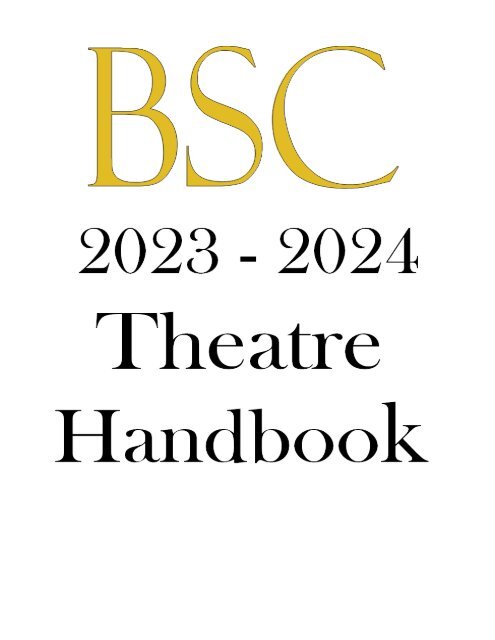
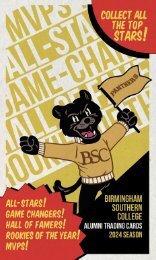
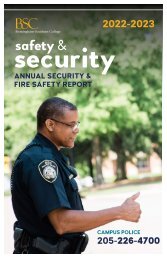
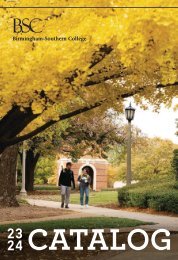
![2023-2024 BSC Catalog Updated_UG ONLY_FINAL[82]](https://img.yumpu.com/68414854/1/178x260/2023-2024-bsc-catalog-updated-ug-only-final82.jpg?quality=85)
